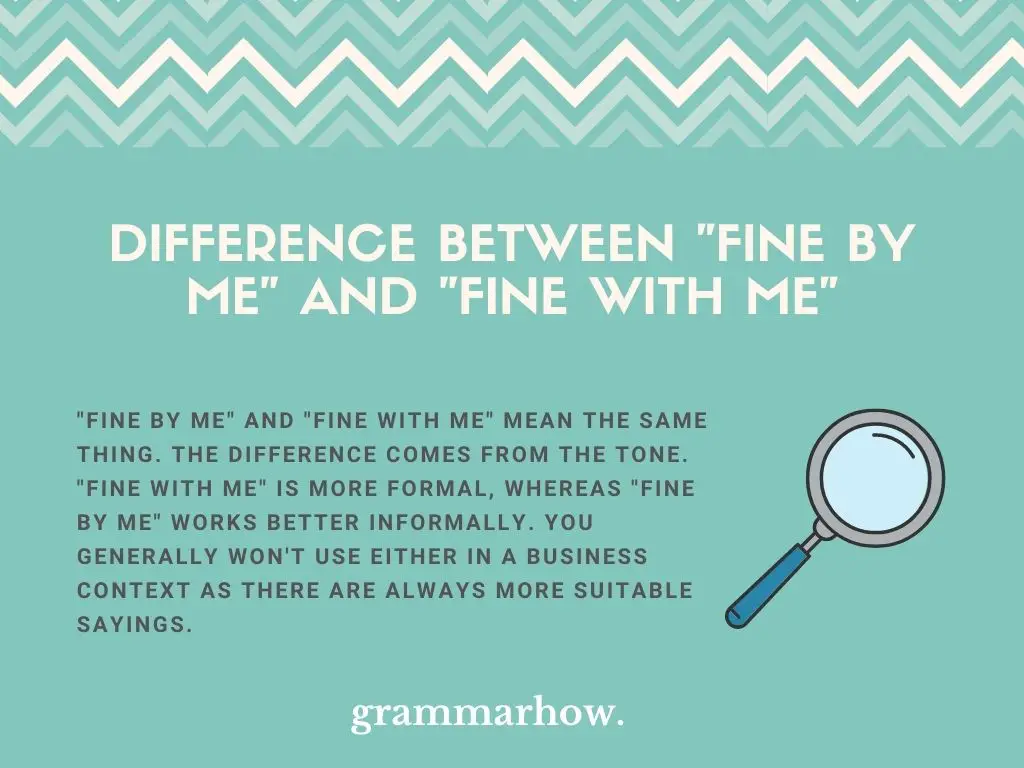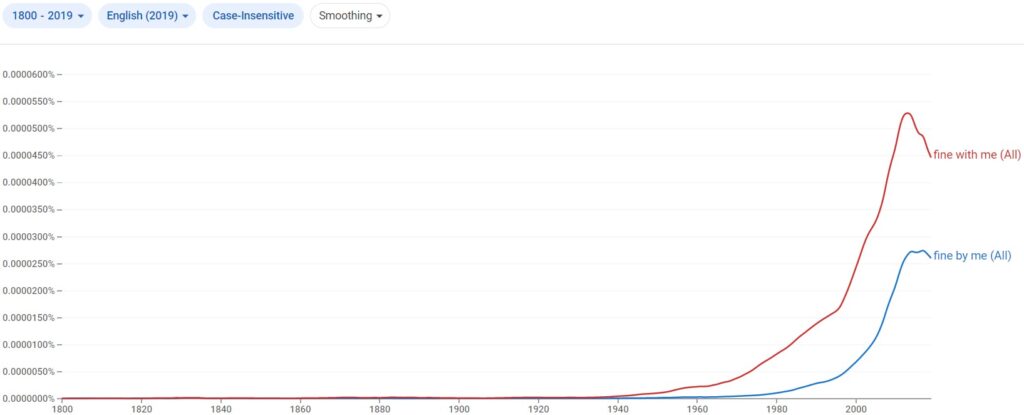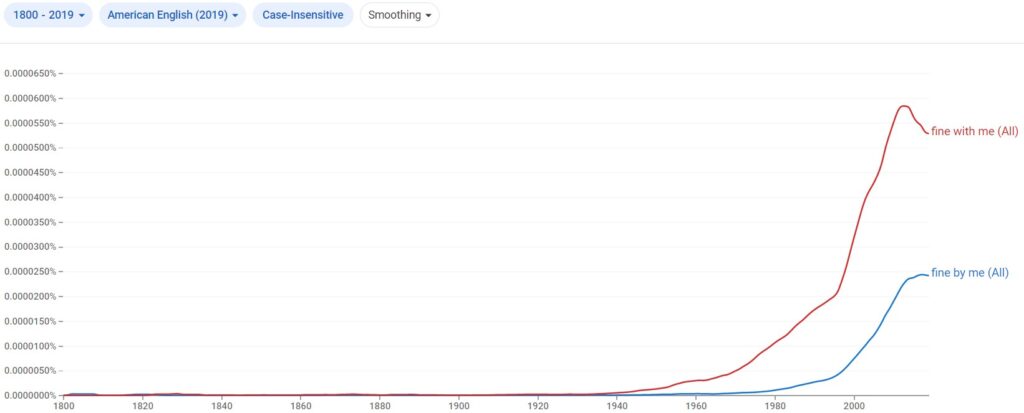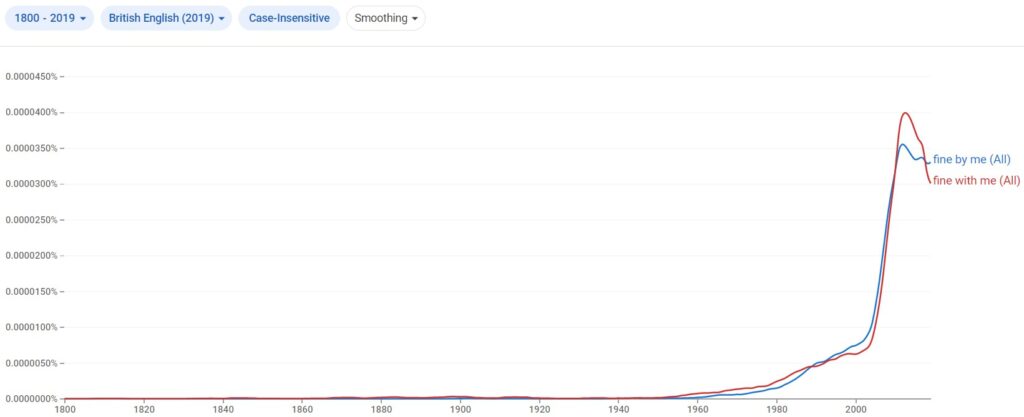“Fine with me” and “fine by me” are similar idioms. Native speakers use them to show that something that has been checked with them is “fine” to go ahead. It might help to know whether there are any key differences, and this article will explain all you need to know.
What Is The Difference Between “Fine By Me” And “Fine With Me”?
“Fine by me” and “fine with me” mean the same thing. The difference comes from the tone. “Fine with me” is more formal, whereas “fine by me” works better informally. You generally won’t use either in a business context as there are always more suitable sayings.

Both sayings mean that something has been run by us, and we’re okay with it. For example, the following exchange might occur:
- Is it okay if I go home early today to see my mother?
- That’s fine with/by me.
As you can see, both “with” and “by” work well here. “With” would probably be more common if you’re the boss and agreeing to an employee’s request to go home early.
What Does “Fine By Me” Mean?
“Fine by me” means that something has been put “by” you, and you agree with it. Usually, someone will have presented you with an option or request, and it’s up to you to decide whether it’s “fine” for them to carry out whatever that request is.
“By” works well because someone will have run something “by” you, meaning they would have checked with you to make sure it’s okay. We simply flip the preposition around on them when we agree to their terms.
- It’s fine by me if you want to go early. I’m not keeping you around, so you can do whatever you want.
- Oh, it’s fine by me! Sorry, I thought I’d already agreed to this, but I guess you didn’t get the memo.
- That’s more than fine by me! I’m not going to stop you from doing the things you enjoy. Go out there and have some fun.
- It’s fine by me. Thank you for checking with me, though. I’m glad you have enough respect for me to ask that.
- I think it’s fine by me. I knew you had something to do today, but I wasn’t sure what until you just mentioned it.
- I’ve just checked the schedule, and it’s fine by me. I’m glad you came over here to ask me, though.
- It’s all fine by me. Let’s get this project sent off as soon as possible. There’s no reason to sit on it any longer.
What Does “Fine With Me” Mean?
“Fine with me” means the same as “fine by me.” It’s more common for higher-ups in business to use it in speaking than anything else. It’s the more formal choice, but you don’t often see it in writing because there are better-written phrases that work.
We’re allowed to relax the rules a little more with spoken English. Even when speaking formally, we still don’t have to follow the exact rules that say things like “fine with me” might not be appropriate.
- It’s fine with me that you go home early. I’m glad you came in here to check, though. I’ll remember that.
- It’s fine with me that none of my employees want to do this task. I guess I expected too much from them, but that’s fine.
- I checked with corporate, and it’s fine with us if you want to get this done over the next two weeks. There’s no real rush.
- My schedule is clear, so it’s fine with me. Let’s go and find somewhere to eat where we can enjoy ourselves a bit more.
- It’s fine with me. I think we should all go home earlier today to make up for all the hard work we’ve been putting in.
- It’s never fine with me for you to say things like that. What made you think that was such a bright idea?
- It’s fine with me. Thank you for checking it, but we don’t have anything else going on at the moment.
Is It Rude To Say “Fine By Me” And “Fine With Me”?
Some people worry that the two phrases are rude. Thankfully, they are nowhere near close to being so!
There is nothing wrong with using “fine by me” or “fine with me.” They are not rude sayings. The only issue is that they are not the most formal options available to us.
If you’re speaking informally, then you can say either of the sayings with no problems. You will not offend anyone by doing so.
If you’re speaking formally, you can usually also get away with saying them. Again, spoken English doesn’t have the same dependency on grammar rules as written English.
Of course, if you’re writing formally, you might be better off with a different phrase that accepts a request.
Is “Fine By Me” Or “Fine With Me” Most Formal?
We’ve already touched on the formality of the two phrases. While neither is distinctively “formal,” we can still treat one with more politeness than the other.
“Fine with me” is the more formal choice of the two. We use “with” conceptually to allow us to show that something works well “with” us. In this case, “with” implies that it doesn’t affect any of our plans or schedules.
Are “Fine By Me” And “Fine With Me” Interchangeable?
Both of the phrases are interchangeable. We’ve already stated that they can work in the same way. Many native speakers use “with” and “by” interchangeably.
If you were to ask a native speaker to explain the differences, they more than likely wouldn’t know what to say. That’s how we know that you can use the phrases in the same manner without worrying about getting them wrong.
Is “Fine By Me” Or “Fine With Me” Used The Most?
It may also help you to learn which is the more popular choice. While they are both correct and interchangeable, there is a clear winner when we look at the overall popularity.
According to Google Ngram Viewer, “fine with me” is the most popular choice. This might be because it’s the more formal one, so it makes a little more sense to write it (since written English requires more focus on the rules).

Are “Fine By Me” And “Fine With Me” Used Differently In The UK And The US?
While the statistics from the previous section are clear, there might be an explanation for them. If we split the graph into UK and US English, we might learn a little more about how each phrase is used.
According to Google Ngram Viewer, “fine with me” is the most popular choice in American English. The trends in this graph are nearly identical to the overall English graph we shared in the section above.

However, things get interesting when we look at Google Ngram Viewer for British English. Both phrases are used in British English, but “fine by me” is actually the more prominent of the two.

American English uses “fine with me” more than “fine by me.” British English uses both phrases nearly identically, but “fine by me” is slightly more popular.
Since American English makes up a much greater portion of the world population, it makes sense that their graph will have more of an impact on the overall English graph from the previous section. Thus, “fine with me” is overall the more popular choice.
When Should I Use “Fine To Me”?
“Fine to me” is a bit more specific in its usage. We only use it with verbs like “looks,” where we can talk about something “looking fine.” We use this to show that we’re okay with that thing existing, and its current state is simply “fine” or “okay.”
- This project looks fine to me. When do you think you’ll be able to start working on it?
- This painting looks fine to me. I’m not really sure I’d like to see it in my condo, though.
- It looks fine to me. Why are you asking? Is there something wrong with it?
- This all looks fine to me. Where do I sign, then?
- Oh, it seems fine to me. I think you’re overthinking this a little bit. Maybe you should just let it go.
Is “Fine For Me” Correct?
“Fine for me” also requires a verb beforehand to make it work. In most cases, we use “works” to show that someone’s plans work well for the time they might have suggested.
Generally, “fine for me” only applies when creating plans or setting dates. It’s the least popular choice of all the prepositional choices because it doesn’t apply to many contexts.
- That works fine for me. I’m glad you asked me about my schedule, though.
- It works fine for me. Let’s go at that time, and we’ll make a day of it.
- Your plan works fine for me. Let’s get it done as soon as we can.
“Fine By Me” And “Fine With Me” – Formal Synonyms
Finally, let’s go over some formal synonyms that would work (even in written formal English).
- Go ahead
- Sure
- Of course
- I will confirm
- Agreed
- Go right ahead
- Be my guest
- Absolutely
- Very well
- No problem
You may also like: Fine With You vs. Fine By You vs. Fine To You

Martin holds a Master’s degree in Finance and International Business. He has six years of experience in professional communication with clients, executives, and colleagues. Furthermore, he has teaching experience from Aarhus University. Martin has been featured as an expert in communication and teaching on Forbes and Shopify. Read more about Martin here.
